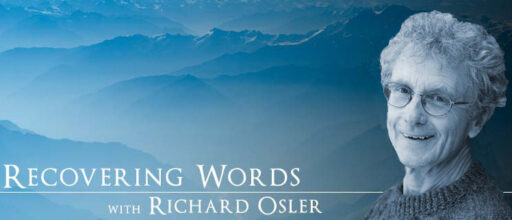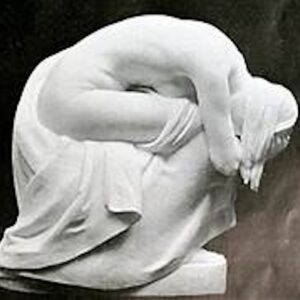I suppose it’s sort of incestuous to write a blog post about another blog. But so be it. And anyway, Richard Osler’s website Recovering Words is much more than a blog. It does include posts. But the site also features descriptions of retreats that Richard offers on poetry as prayer, on poetry writing, and on poetry for recovering addicts; quotes by a range of writers about poetry; poems by some of his favorite poets; some of his own poetry; and more.
I first met Richard in 2004 at Image Journal‘s annual Glen Workshop: a weeklong experience of literature and other arts. We renewed our acquaintance at subsequent Glens and have been in touch off and on ever since.
But what I want to focus on here are the treasures of the blog that Richard has been writing since he set up the Recovering Words site in 2010. Most of the posts engage something in Richard’s own journey into and through poetry: writing it, reading it, being moved by it. And the poems he engages are nearly all by contemporary poets—a few famous but mostly lesser known. I feel enriched for having been introduced to them.
One motif running through these twelve-plus years of posts is poetry’s voice from the darkness—poetry’s expressions of suffering, loss, despair. One post focuses on “depression” as a theme in the poems of Robin Williams and Jane Kenyon. Another post, praising poet Anne Michaels for “her searing collection, her epistolary book of poems of loss and grief, saying good bye and letting go,” quotes from her poem “Bison”:
the stillness between silence
and muteness
the moment desire forcibly
is renamed
grief
the precise space between
those two words.
In another post, Richard writes of Philip Metres’s poem “Solstice Prayer” that the “gift for me in this poem is its cry out in the darkness for some transcendent touch.”
But more often, Richard is attracted to poems that find light in the darkness, hope conquering despair. One post is titled “In a World Full of Falling, Full of Grief, also Solace—The Poetry of Danusha Laméris,” and it’s the “solace” that Richard embraces. In another post, Kathleen Raine’s “The Northumbrian Sequence – Part IV” is for him a “heart-cry of a poem that embraces darkness as a way to find the light!”
So of course, as a poet himself, he’s drawn to poems that present the writing of poetry itself as healing. And of course (again) that brings him to Denise Levertov’s beloved poem “Writing in the Dark.” Richard quotes the whole poem, then returns to these lines:
Keep writing in the dark:
A record of the night, or
Words that pulled you from the depths of unknowing,
Words that flew through your mind, strange birds
Crying their urgency with human voices,
Or opened
As flowers of a tree that blooms
Only once in a lifetime:
Words that may have the power
To make the sun rise again.
Richard then comments: “I so like the suggestion in the poem that we must write out of a dark that might not be night alone. I was feeling that dark a few days ago. The usual mind-clatter about not having the poetic chops anymore.” But he began writing a poem, not knowing where it would lead, and by the end “my inner darkness lifted.”
Balancing Richard’s interest in poems of darkness are many posts glorifying light. There’s a post on poems that celebrate wedding vows. Another post quotes Julia Harwig’s four-line poem “Feeling the Way”:
The most beautiful is what is still unfinished
a sky filled with stars uncharted by astronomers
a sketch by Leonardo a song broken off from emotion
A pencil a brush suspended in the air
Richard’s comments on this poem express gratitude for “its captivating idea. This idea that something unfinished still retains utter possibility. And promise. And in that, becomes the most beautiful.”
Then there’s his post on a young poet’s debut collection, Pleasuring Shahrazad. Richard quotes some lines: Don’t you miss // feeling, feeling, feeling? And failing, the soul search / follows, from which you promise yourself to be reborn? And Richard responds simply with this word: “Gorgeous.” Then he adds: “And so much of this gorgeousness, but even more sonically attuned, in Pleasuring Shahrazad. The rich seductive language, the musical notes hit again and again and its sheer erotic exuberance.”
And I can’t end without noting Richard’s delightful post on a long poem found inside the label of a bottle of a local beer. The poem, titled “A Found Poem—Gratitude” begins:
For people —
For people who are naturally given to generosity, no matter their means.
For industrious people who build things great and small and take pride in accomplishment.
For people who try to do their best, but cannot.
For people who only half believe their own stories.
For people who are steeled inside the cage of adversity, but still sing.
For people who laugh with ease and abandon.
For scientists and poets who drill through mountains to get at the truth.
And so on, for thirty-four more lines.
I look forward to many more years of Richard Osler’s Recovering Poetry. It’s a gift to all of us for whom poetry profoundly matters. For whom, as Jill Pelaez Baumgaertner says in a passage that Richard includes on the “Poetry Quotes” page of his website, “…poetry…speaks as no other language can. It does what no other art form can do. It compresses experience; it intensifies language; it uses words to say the unsayable… Poetry cracks open our everyday lives, the mundane worlds in which we spend so much unconscious time. It releases the extraordinary bringing us to a different level of consciousness.”
Amen.
Peggy Rosenthal has a PhD in English Literature. Her first published book was Words and Values, a close reading of popular language. Since then she has published widely on the spirituality of poetry, in periodicals such as America, The Christian Century, and Image, and in books that can be found here.





